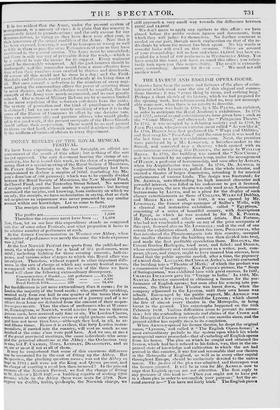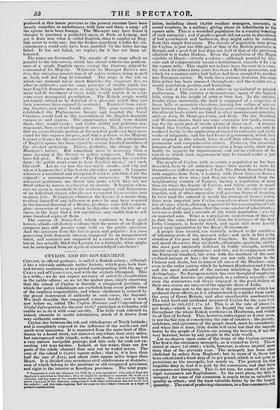THE LYCEUM AND ENGLISH OPERA-HOUSE.
Viteinus have been the names and fortunes of' the place of enter- tainment which stood near the site of this elegant and commo- dious theatre: it was " every thing by turns, and nothing lona." Perhaps a short sketch of its history, which we had prepared 'for the opening week, but column-room failed us, may not unaccept- ably come now, when there is no novelty to describe.
The Lyceum was built in 176S, by a Mr. PAYNE, an architect, in order to anticipate the Royal Academy's exhibitions. In 1776 and 1777, several casual entertainnieuts were given here ; such as the " Comic Mirror," and afterwards the " Patagonian Theatre." In 1782, it was occupied by a debating society; and in 1789, by JACK PALMER, who gave an enlertai.maint called " As you like it." In 1790, Diem x here first performed his " Wags and Oddities," and first sung his " Pool-Jack and the same year it was used for the last time as a pie me-exhibition-room. Next, the premises were purchased by a M.. LINGISAM, a breeches-maker in the Strand, and converted in.o a theatre; which opened with an entertainmeni soraething like DIEDIN'S, the music by WILLIAM REEVE. ID 1795, the building was named the " New Circus ;" and was tenanted by an equestrian troop, under the management of Harvey, a professor of horsemanship, and soon after by ASTLEY, when his Amphitheatre was burnt. In 1798, Dr. ARNOLD, in conjunction with LINGHAM, pulled down the whole interior, and erected a theatre of larger dimensions, intending it for musical performances of various kinds. The design was frustrated; for Dr. ARNOLD, notwithstanding his high musical character and powerful interest, was foiled in his endeavour to get it licensed. For a few years, the new theatre was only used as an Astronomical lecture-room by LLOYD, and as a place for the display of such chance entertainments as those of COLLINS, WILES (of Dublin), and MOSES KEAN: until, in 1801, it was opened by Mr. LONSDALE, the former stage-manager of Sadler 's Wells, with a classical and instructive exhibition, called " Egyptians;' consisting of a series of beautiful scenery, with descriptions of Egypt, in which he was assisted by Sir R. K. PORTER, Mr. MuLREADy, and other eminent artists. But Fortune, who had not vouchsafed a smile on any of the prior occupants of this spot, frowned also on Mr. LONSDALE ; and at the cud of one season the exhibition closed. About this time, PHILIPSTAL, who first introduced the Phantasmagoria into this country, occupied the smaller theatre (for the building was then divided into two), and made the first profitable speculation there. BOLOGNA, the Covent Garden Harlequin, tried next, and failed: and DIDDIN, whose extraordinary and versatile powers as a writer, poet, com- poser, player, and singer, ought to have insured him success, here found that the public appetite needed, after a time, the piquancy of a novel dish. LAURENT, the Clown at Astley's, in1805 converted the building into a "Theatre of Mirth ;" of which the product was a commission of bankruptcy. KER PORTER'S picture, the " Siege of Seriugapatatn," was exhibited here with great success. In 1807, CHARLES INCLEDON gave his "Voyage to India." In 1809, Mr. SAMUEL ARNOLD succeeded in obtaining a licence for the per- formance of English operas; but soon after his coming into pos- session, the Drury Lane Theatre was burnt down, when the company adjourned to the Lyceum, until their own house was rebuilt. Encouraged by the public support, Mr. ARNOLD was induced, after a few years, to rebuild the Lyceum ; which shared the fate of almost every theatre in the Metropolis, in being burnt to the ground. This catastrophe happened on the 16th February 1830. Various difficulties arose to prevent its reerec- tiona but the contending interests and claims of the Crown and the Marquis of EXETER were adjusted some months since, and the present edifice has rapidly risen to its completion. When ARNOLn opened his former theatre, he dropt the original name, "Lyceum," and called it "The English Opera-house;" a most extraordinary prelude to the system upon which his whole managerial career proceeded—that of excluding all English operas from his house. The plea on which he sought and obtained the licence, which had been refused to his father, was, that in the im- proved state of knowledge and cultivation to which the art had arrived in this country, it was fair and reasonable that one theatre in the Metropolis of England, as well as in every other capital throughout Europe, should be exclusively devoted to the native music. The justice of the plea was admitted, and thereupon was the licence granted. It will be in vain for Mr. ARNOLD now to urge that English operas are not attractive. The first reply to any pretence of this kind is— " Then you ought not to have put in a sham plea in order to accomplish your purpose:" but the se- cond answer is—" You have not fairly tried." The English pieces produced at this house previous to the present summer have been merely comedies or melodramas, with here and there a song: all the operas have been foreign. The Manager may have found it cheaper to purchase a published opera at Paris or Leipsig, and get it done into what is called English, than to employ an Eng- lish artist to write one: but the former expedient (under his cir- cumstances) could only have been justified by the latter having failed. It has not failed, we repeat; for it has not been at- tempted.
The times are favourable. The annals of our stage afford no parallel to the late season, which has closed without the perform- ance of a single English opera, except the Duenna, -played by command of his Majesty. Whatever be Manager Buse's mo- tive, this sweeying proscription of all native writers, living as well as dead, will not long be tolerated. The stage is the soil on which our national music must flourish—the composer has no other to cultivate ; and the same principle of vitality which has kept English dramatic music so long in beiug, under discourage- ment and ill treatment of every Lind, would enable it to over- come even managerial proset•iption. The British people would not tamely submit to be deprived of a pleasure which they and their• ancestors have enjoyed for centuries. Banished from exist- ing theatres, new ones would arise. The same reasons which established the Philhai motile Society and founded the Vocal Concerts, would lead to the association of the English dramatic eompos rs and singers. The opportunities which were denied them, they would create ; and under skilful and judicious ma- nagement, they need not despair of success. Mr. Ausrosn knows that no inconsiderable portion of the musical profession have asso- ciated for this express purpose, and that a petition to his Majesty to grant a licence for• the erection of a theatre for the performance of English operas has been signed by several hundred members of tl►e musical profession. Hence, probably, the change in the Manager's tactics. But something more is necessary than a mere opening of the theatre to native composers. They must have fair play. We are told—" The English opera has ceased to draw; the public won't come to hear English music ;" and such like stuff Let us see bow the case really stands ; and why and when it happens that it has lost its attractive power. It happens whenever a mutilated and interpolated work is substituted for the original ; a circumstance of everyday occurrence. It happens whenever performers are thrust into parts which they are not fitted either by nature or education to sustain. It happens when- ever an opera is sacrificed to the insolent caprice and domination of an individual singer, who chooses to convert his associates into so many foils. It happens whenever the keeper of a music-shop, availing himself of any influence or power be may have acquired in the musical direction of a theatre, produces sonic dull common• place succession of songs, which he dignities with the title of an opera, in the hope that a few repetitions may enable him to sell some hundred copies of them. The success of Nouejahad, which continues to draw good houses, affords satisfactory evidence that the music of an English composer may still possess some hold on the public attention. And the inference from this fact is plain and palpable: if a piece possessing little dramatic interest, composed by an inexperienced artist, and certainly not supported by a union of first-rate vocal talent, has actually filled the Lyceum for a fortnight, what might not be anticipated from an opera of acknowledged excellence ?





















 Previous page
Previous page